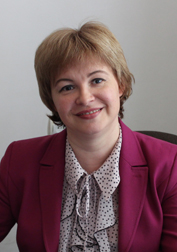Almost every girl in the world has tried to create garments for her dolls – either in a simple way, twisting a piece of fabric over the doll’s waist or in a more sophisticated manner, trying to learn the craft while watching a skilled needlewoman. When Ludmila, a girl from Chisinau, Moldova was sewing dresses for her dolls, adults didn’t take her seriously. Yet a neighbour-woman kept repeating: “Surely one day you’ll be a fashion-designer.” In school Ludmila just loved lessons involving occupational education, where she was taught the basic techniques of tailoring. After the mandatory 8 classes, Ludmila tried to enrol in art school, but she lacked formal painting classes. When she tried to get into a vocational school, in sewing, the director raised her eyebrows: “Why do you want to learn here? You have remarkable grades, you should go to University; our school is for the disadvantaged….”
In grades 9 and 10, in the vocational classes, she learned how to be a seamstress, working on jerseys, and had an internship in “Red Star”, the biggest production enterprise in Moldova in the 1980s. The emerging market of the 1990s and her family situation made her decide: Ludmila should continue her education and develop a career in a reliable profession. And her choice was for construction engineer at the Technical University of Moldova. Not only did she graduate successfully but also worked in construction for a while. Yet the sector was not as safe as predicted; it suffered from ups and downs and turbulence – not very encouraging for a young woman. Setting up and running a small private grocery store was also not very rewarding – it didn’t suit Ludmila’s essence and aspirations. She had never forgotten her childhood dream, but she lacked training in the profession she loved.
In 2015, when the German Embassy donated a set of up-to-date sewing machines, Ludmila had an insight: What if her dream could become true? At that time she was attending pilot courses for adults in Orhei, a town 45 kilometres from the capital, where she moved to as a young woman after graduation and started a family of her own. The courses had nothing to do with sewing – they were motivational classes for adults, organised by the NGO Filantropia Crestina (Christian Philanthropy) in partnership with DVV International and run by a professional psychologist who was trying to inspire adults to develop an interest in learning, active community involvement and personal growth. As far as Ludmila was concerned, she was ready for a change. And when in 2016 the first non-formal course in sewing on German machines was announced, Ludmila was the first one to sign up and to invite other women to enrol. The uncommon thing about the course was that it was going to take place in a non-formal context, not in a formal professional school. For the first time, in Moldova, a shorter-term vocational-training curriculum was especially adapted for adult learners and was successfully piloted with 10 women in the summer of 2016. The idea was very challenging, but DVV International’s local partner, the Filantropia Crestina NGO took the risk and got significant outcomes. By the end of the year, 30 disadvantaged women overall got relevant professional training and began practicing sewing for their families or for customers.
Ludmila in class
After almost 3 months of learning, graduates of the first non-formal course in sewing were able to take orders and produce high quality products in Orhei: customised school uniforms, ecclesiastical garments, clothes for ordinary people, etc. Ludmila is now among the three women who have been hired in a small sewing shop. In addition to sewing, as part of the same project supported by DVV International, women in Orhei are learning how to do hand-made embroidery and make traditional outfits for their family members. They also share beliefs about the value of lifelong learning. By the end of 2016, the Filantropia Crestina NGO got its sewing course curriculum endorsed by the Ministry of Education and graduates are going to receive certificates for the training hours attended. However, when asked about the value of the certificate, beneficiaries said: "It is great to have a certificate, but by far more valuable are the skills we got – ones that are useful today and will increase in value every day.” With this thought in mind, Ludmila hopes that her development will continue and maybe one day she will exceed her limitations and create her own business – make real a thing out of what originated as a childhood dream.



